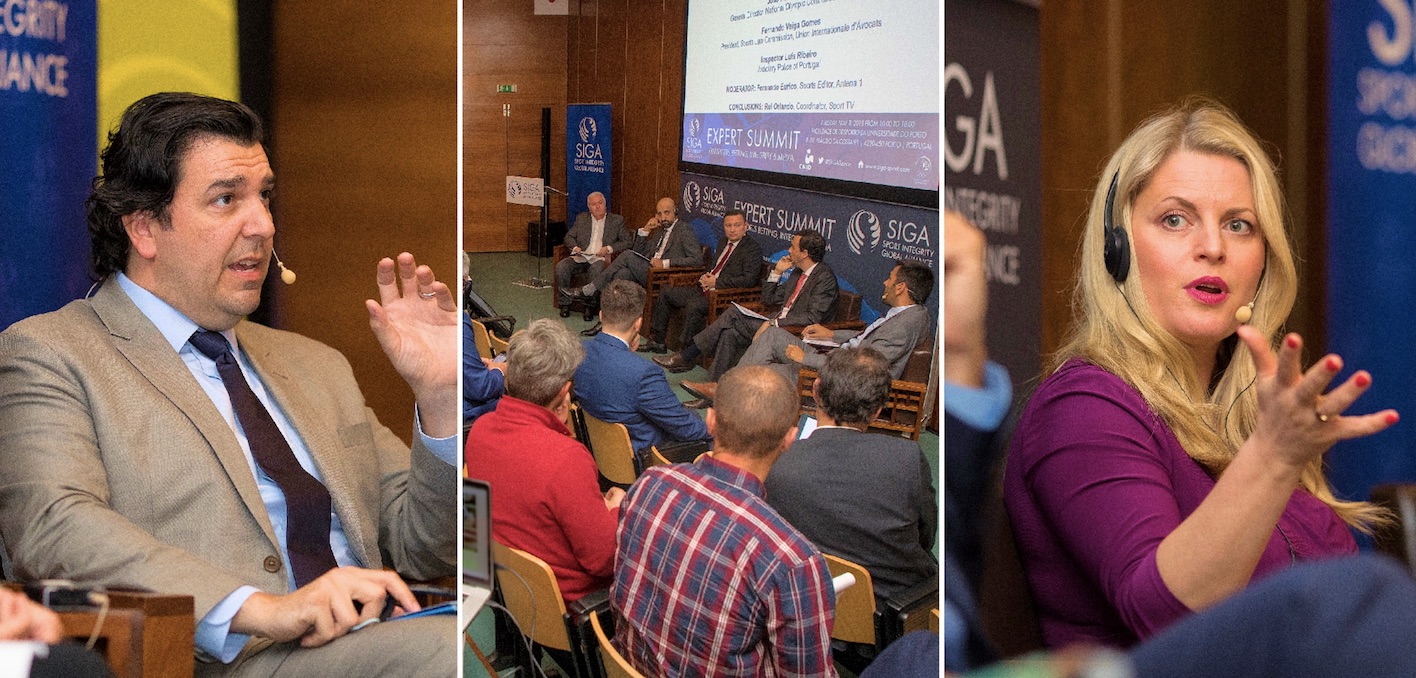By Paul Nicholson
May 10 – The battle against betting related match-fixing needs to be stepped up with stronger regulation and real co-operation between the anti-matchfixing stakeholders, was the overriding message from the first SIGA Expert Summit on Sports Betting, Integrity and Media that closed in Porto, Portugal, this week.
SIGA (the Sports Integrity Global Alliance) gathered together anti-matchfixing practioners, law makers, sport governing bodies and media in Porto, hosted by the National Olympic Committee of Portugal and the National Club of Sports Press (CNID) as well as the daily newspapers A Bola, O Jogo and Record and Portugal’s public radio station Antena 1.
At the heart of debate was the role of regulators and how much more needed to be done. Emma McClarkin (pictured right), MEP, European Parliament, said: “It is time to harness political opinion and shine a light on this area to find a fully regulated solution. We need to make sure we are criminalising matchfixing, we need to take this very seriously.”
Pointing towards SIGA’s already developed thinking on the issue, she said: “There is much that needs to be done but the SIGA Universal Standards on Sports Betting Integrity are the starting blocks for the changes that need to be effected ahead. I believe Sport will win. But we need all stakeholders to come to fight against the manipulation of Sport to ensure we protect the special spirit of sport.”
Luís Ribeiro, Criminal Investigation Coordinator – Anti Corruption National Unit – Portuguese Judiciary Police, echoed the need for EU countries to work together, something they aren’t doing at the moment as matchfixers pretty much are finding the field to themselves and free of law enforcement.
“Match-fixing, especially match-fixing for betting purposes, is considered ‘the problem’. Criminal organisations have found a high revenue and low risk activity and are exploiting the lack of legislation in most of the EU countries, but not only,” he said.
“To reach effective results, the authorities of EU countries need to work together. Varying commitment from the different EU states makes this result difficult to reach.”
A point further developed by Laurent Vidal, professor, Sorbonne University, who said: “80% of the sports betting market is illegal today. There is a tsunami of illegal betting in sport. Government are too far behind organised crime. We must regulate internationally.”
Mark Lichtenhein, chairman of the Sports Rights Owners Coalition (SROC) raised the issue of whether sports are actually financial winners within this huge betting market estimated at between $2-3 trillion.
“One of the intellectual property areas that is not being monetised by sports rights owners is gambling – there is not any direct revenue going back to sport. This is exploitation of sports’ IP. Betting and match-fixing are inextricably linked. There needs to be a better relationship between sport and gambling market. There should be an integrity fee that goes back to sport,” said Lichtenhein.
While this would almost certainly meet resistance from bookmakers, a betting integrity tax would certainly focus minds on the issues of matchfixing and there is no doubt that to effectively battle the criminal gangs and their web of fixers, more money is needed.
João Paulo Almeida, general director of the National Olympic Committee of Portugal, said: “There is lack of information and ignorance on the subject of sports betting… If we do not stay apace with the criminal infiltration and match-fixing we will be puppets in their hands.”
Addressing the information gap requires media participation, a point made throughout the day to a predominantly Portuguese media. Part of the solution is in education and Nick Raudenski (pictured left), chief integrity officer at UEFA warned: “It is a grave mistake to say that the training and education stage is over. We must continue to upkeep the responsibilities we have as governing bodies to tackle this threat. At UEFA we have made it that any new player to UEFA Competitions will receive the basics of training, education and awareness of match-fixing, doping, and our #EqualGame campaign.”
If there were still doubters as to the gravity of the situation, Fernando Veiga Gomes, president, Sports Law Commission, Union Internationale d’Ávocats, made the sobering comment that: “After drugs, human trafficking and weapons, match-fixing is the next biggest problem for the legal system. Dirty money and international criminals must be stopped from acting in Portugal. There is no control for money laundering. We must work preventatively.”
Summing up, Emanuel Macedo de Medeiros, CEO of SIGA, said: “Vast sums of money are being invested in the sports betting industry with little to no oversight. The existing regulatory framework is simply ineffective. There is an urgent need to address this and overcome what is perceived as an apparent paralysis.
“If we are to safeguard sport and drive positive change in the industry, we must work collaboratively. Only by coming together and agreeing to a strong, global approach can we hope to effect the change so desperately needed.”
Macedo de Medeiros talked about the battle against matchfixing changing its tack from being no longer at an arrival point, to a departure point.
To that end SIGA also took the opportunity to hold the first meeting of its newly formed Standing Committee on Sport Betting Integrity which pledged to:
- Review the SIGA Universal Standards on Sports Betting Integrity and provide feedback for any required update
- Promote research into key issues in Sports Betting Integrity
- Encourage and work with SIGA Supporters to adopt the SIGA Universal Standards
- Reinforce and improve public awareness and understanding of issue around Sports Betting Integrity
- Showcase and create opportunities for innovative Sports Betting Integrity products
- Examine and advise on a framework for a Sports Betting Integrity Tax
Contact the writer of this story at moc.l1734971168labto1734971168ofdlr1734971168owedi1734971168sni@n1734971168osloh1734971168cin.l1734971168uap1734971168

